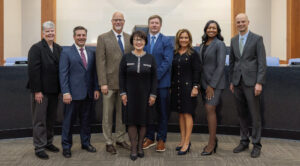Harvest woman fights breast cancer with Joy as her strength
HARVEST — Andrea Brezzell is used to being a busy woman.
From running her own home health care business to homeschooling her two children as they grew up, she would be on her feet from the time she hopped out of bed in the morning until she climbed back into bed late at night.
A self-described “health nut,” one might consider Brezzell somewhat of an expert on health and wellness. She paid close attention to her diet, exercised regularly, held health expos and traveled across the country for health seminars.
That’s why, in 2010, she didn’t think too much of a lump she noticed on her breast while drying her back after a shower.
“I thought it must be a cyst … but there was this sixth sense, this very small, still voice that was like, ‘This is more serious,’ but of course, I dismissed it,” Brezzell said. Nevertheless, she went to see a doctor as soon as possible. That doctor urged her to go to the Crestwood Women’s Center in Huntsville for a mammogram. Things quickly took a more serious turn.
“When they did the mammogram, the doctor pulled me in the conference room and said, ‘We need to do a biopsy. We need to do it now.’” Brezzell recalled.
Despite the doctor’s urgency, Brezzell insisted on going home first to make dinner for her family. She promised to come back afterward for the biopsy, and she kept her word.
“In my mind, if this was the road, I wanted everything to remain as normal as possible,” Brezzell said. “I had not adjusted my mind as to how I was going to tell my family—if I was going to tell my family—so if I’m not home to cook dinner, [my family] was going to start questioning. ‘Mom, where were you? What happened?’ I didn’t want those questions. I wanted to cook dinner, so I’m going out the door to go home and cook dinner.”
Just a day or two later, the doctor called and said she needed to see Brezzell and her husband in her office first thing Monday morning. It was the week of Thanksgiving. At that point, Brezzell said she already knew. Come Monday morning, she heard a sentence nobody ever hopes to hear: “The results came back, and it’s cancer.”
She had been diagnosed with Stage I ductal carcinoma—the first in her family to receive a breast cancer diagnosis. Though Brezzell never planned to have cancer, she already knew that she wanted to have a bilateral mastectomy.
“I wanted it done, over with, keep it moving,” Brezzell said. “I have my whole life ahead of me, my children are young, I don’t have time for this.”
Since she “doesn’t do pain,” Brezzell had decided to have a surgeon perform the mastectomy and reconstruction at the same time. She, her doctor and her sister in Detroit, Michigan, decided to do their own research and come up with a list of three potential surgeons. When they came together, there was one surgeon that appeared on all three of their lists: Dr. Michael Littleton, a general surgeon at the University of Alabama at Birmingham. He and his plastic surgeon partner handled Brezzell’s surgery, which she said “came out perfect.” The trouble, however, did not end there.
“When I had the surgery and everything, yes, my children knew [I had cancer],” Brezzell said. “Everything went well, I told the kids it’s all gone, God is good, and we kept it moving. The second time it came back, that’s when I didn’t tell the children.”
With her daughter away at her first year of college and her son having just started public school in the eighth grade, Brezzell was determined not to be a hindrance to her children’s academic success.
“I became a professional liar to my children, hiding it from them,” Brezzell recalled, laughing.
On her “bad days,” Brezzell would do whatever she could to make it appear that she had had a busy day. Before her son got off the bus from school, she would get dressed, put on her wig and makeup and greet him as usual. They would eat dinner together as a family. After about an hour, though, Brezzell was running out of energy. Her son knew this was unusual.
“For me to crawl up in the bed, my son was like, ‘Mom, what are you doing? Why are you in the bed?’ I would say, ‘Oh, honey, I had to go to this bank and that bank, I had to see this client and that client,’ I was just coming up with stuff,” Brezzell recalled. “… I was able to get away with that for a while, then he’d start really looking at me like, ‘Mom, seriously. What is going on?’”
The type of breast cancer Brezzell had was her2 positive—estrogen positive—so she needed to explore more treatment. Not knowing this, the cancer had returned two years later in the form of what looked like a small pimple on the outside of her reconstructed breast. After receiving confirmation from her surgeon that her cancer had returned, Brezzell had sought an oncologist in Huntsville. Unfortunately, the oncologist she found was not a good match for her, and she knew she needed a second opinion. Her husband suggested she call the Cancer Treatment Centers of America.
“I was ignorant to breast cancer,” Brezzell admitted. “I only thought there was one. I had no idea there was so many. … When everything went well [the first time] and the pathology report came back that we had got it all, I did my hallelujah dance and kept it moving. I thought, ‘I’m good,’ but had I known then what I know now, I would have seen an oncologist.”
Only five CTCA facilities exist across the country. The center in Atlanta had a waiting list, so Brezzell turned to the center in Chicago. There, she met renowned oncologist Dr. Dennis Citrin. Already filled with anxiety and in low spirits after her experience in Huntsville, Citrin was a welcome beacon of light and hope for Brezzell.
Originally from Great Britain, Citrin attended medical school in Scotland and completed a residency in internal medicine. His experience researching bone scanning, an early technique for identifying the spread of cancer, led him to oncology. In the years that followed, Citrin became “immersed” in breast cancer research, obtained his PhD and completed a fellowship in human oncology at the University of Wisconsin-Madison. After 20 years of working in the breast cancer field, Citrin joined CTCA in 2004. He said CTCA’s commitment to placing primary focus on the patient is what first attracted him.
“When working with patients, even those diagnosed with the same cancer type, our approach is that every cancer is as unique as the person fighting it,” Citrin said.
By the time Brezzell started going to see Citrin, it was June 2013, which meant her daughter was home from college, and her son was also enjoying summer break. She said it was a good time for them to be able to process the news and see her start doing better before school started back.
Citrin noted that each patient is assigned a multidisciplinary team to not only treat the cancer, but also to help the patient manage side effects, maintain energy and stay strong in every sense. This was one aspect of CTCA that Brezzell said she loved.
“They need you mentally to be strong enough to go through this fight, and everybody there is nice down to the person that sweeps the floor,” Brezzell said. She also praised CTCA for their dedication to taking care of patients’ caregivers and helping everyone to feel as comfortable as possible.
“That’s part of the healing process,” Brezzell said. “It makes it easier. It’s less stress upon you as possible, and you can focus on you, and you also know that your caregiver is being taken care of as well. If they need something, they go out of the way for them, too.”
Citrin noted the importance of understanding one’s family medical history, as well as certain factors that have been determined to increase the risk for developing breast cancer. These include a mutation in the BRCA gene, family history of cancer in the breast or ovaries, a previous breast biopsy that shows abnormal cells, a history of radiation treatment to the upper body in adolescents and exposure to estrogen therapy, especially when it is with progesterone after menopause. In contrast, Citrin said the following factors do not cause breast cancer: stress, hair dye, trauma to the chest, too much sugar in the diet and uncomplicated fibrocystic disease.
When it comes to genetics, Citrin said about 10 percent of all types of breast cancer can be shown to be associated with a breast cancer gene. The most common is the BRCA gene, which Brezzell said she did not have.
For Jewish women, a diagnosis usually comes at a younger age and for women with a family history of breast, ovary or pancreas cancers. About 10 percent of breast cancers are associated with a mutation in the BRCA gene for Jewish women, compared to about 2 percent in Hispanic women’s cases. Citrin said breast cancer is less common in both Hispanic and black women than white women, but the cancer occurs in younger patients and is usually a “more aggressive biological type.” About 2,000 men in the United States will develop breast cancer, according to Citrin, and the risk factors are mostly the same.
Citrin urged women to seek immediate medical help if they feel a lump in their breast.
“In my opinion, most women who delay seeking medical help after feeling a lump in their breast do so because of fear,” Citrin said. “It’s very natural to be afraid of cancer, but we can’t let that fear prevent us from seeking prompt medical help.” He noted that early breast cancer is “a highly curable disease,” and treatment has become much more tolerable over the years. Not only that, but cancer treatment has become much more personalized, as Brezzell experienced.
Brezzell said her treatment at CTCA is mostly hormonal since her cancer is caused by estrogen. She also underwent radiation after the cancer was “totally eradicated” to prevent it from returning. Though the cancer has not returned where it was, Brezzell said it has metastasized to her bladder and lymph nodes in her neck. In early 2017, her health began to decline again. This time, she admitted, she had lost some of her fighting spirit.
“I had said to myself, but I didn’t tell my family, ‘I’m done,’” Brezzell said, “I was asking Jesus, ‘Come get me. I’m done. I’m just so done. I’m done. I’ve fought a good fight.’”
It took a small miracle to lift Brezzell back up. That small miracle, it turns out, was her three-year-old granddaughter, Joy.
“She could tell Grandma had given up, and I believe that the spirit of the Lord used her to pull me back from that state where I had finally thought, ‘I’m not going to come back from this, and I’m giving up,’” Brezzell said.
Joy needed her grandmother to help take care of her, and Brezzell had determined to start walking to build up the energy she needed to do just that. She started out walking around her neighborhood, and soon, walking turned into jogging, something that Brezzell, now in her 50s, said she had not done since her 20s. At the behest of friends and family, she said she recently decided to start writing a book about her journey and will have a full chapter on Joy’s role in giving her the strength she needed to carry on.
Brezzell also found strength in the lifelong friends she has made “from all over the world” at CTCA in Chicago. This past summer, Brezzell and about 500 other CTCA patients were invited to the Chicago center to celebrate five years of surviving cancer. Honorees were able to bring family and friends to the festivities, which included a hotel stay, musical entertainment, a delicious food spread, giveaways, karaoke and words of encouragement from the founder of CTCA.
“They treat you like you’re a movie star,” Brezzell said. “They rolled out red carpet, so as we stepped off the bus, we were walking on the red carpet, and they were taking pictures, and all the staff that could be out … they were just clapping and yelling and screaming just like we were walking a runway or something.”
There was also a symbolic tree ceremony in which each of the survivors had a tree planted in their name.
“They did that for us, which was amazing because of what the tree represents: strength and stability and how it goes through the storm, and no matter what, it’s still there,” Brezzell said. “It still holds on. We may lose leaves—representing you may lose your hair—this, that and the other. Still, in all, you’re still here.”
Brezzell said she was moved by the CTCA Founder Richard Stephenson’s words of hope and encouragement, as well as the story of why he decided to establish the hospitals. The celebration served as a reminder that cancer does not have to be a death sentence.
“This is a tough road for anybody to be going through because when you’re told you have cancer, you never hear, ‘I have cancer,’” Brezzell said. “You hear, ‘You’re going to die.’ You ask any cancer recipient—I don’t know how that happens, but it’s amazing.”
To decrease the risk of developing breast cancer, Citrin recommends eating a diet low in animal fat, exercising regularly, keeping weight down, drinking very little alcohol if any, avoiding cigarettes completely, getting enough vitamin D and calcium, as well as following through with regular screenings. He also advises getting screened every year instead of every two years.
For those who do find themselves faced with a cancer diagnosis, Brezzell said the first thing to do is breathe, relax and step back. She also said it is important not to look at a diagnosis as a death sentence.
“The way I describe it, it’s like a gift wrapped in disgusting, ugly, nasty gift paper, but once you get past all of that and you open up the inside, there’s a beautiful gem on the inside,” Brezzell said. “You find out what you’re made of. You find out how much you can take, and what you can’t take. You find out what your family is made of, who your support system really is because sometimes we really don’t know. You find out that there’s just so many beautiful people in this world, and you just never know where this is going to take you.”
For more information on breast cancer and stories of patients under his care, read Citrin’s book, “Knowledge is Power: What Every Woman Should Know about Breast Cancer.”

















